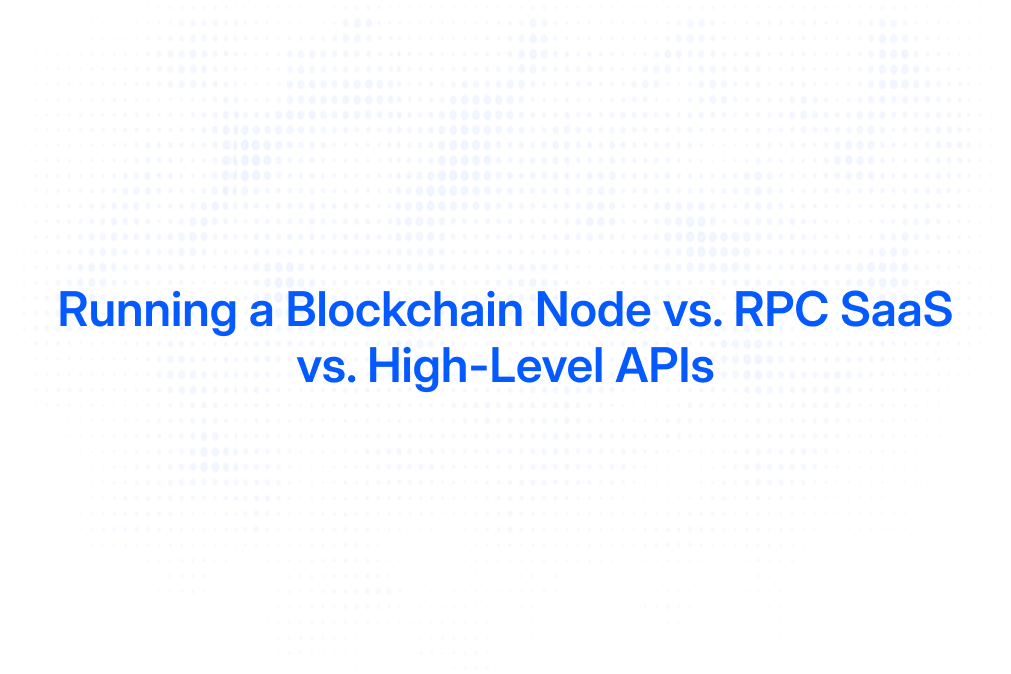The Role of MCP in Scaling Blockchain APIs
In the rapidly evolving world of Web3 and blockchain technology, the demand for scalable, reliable, and efficient API infrastructure has never been greater. As decentralized applications (dApps) grow in complexity and user base, the underlying blockchain APIs that power them must handle increasing volumes of requests without compromising performance or uptime. This is where the concept of Multi-Cloud Proxy (MCP) emerges as a game-changer in blockchain infrastructure.
This article explores the critical role MCP plays in scaling blockchain APIs, its benefits for Web3 developers, and why it represents the future standard for reliable, high-performance blockchain connectivity.
Understanding MCP and Its Importance in Blockchain Infrastructure
What is Google MCP and Why It Matters for Blockchain?
Google Multi-Cloud Proxy (MCP) is a sophisticated networking solution designed to route API requests across multiple cloud environments seamlessly. For blockchain applications, MCP enables developers to distribute RPC (Remote Procedure Call) requests across various cloud providers, regions, and infrastructure setups. This multi-cloud approach ensures that blockchain APIs are not tied to a single provider or data center, significantly reducing risks related to downtime, latency, and vendor lock-in.
In blockchain infrastructure, MCP acts as an intelligent traffic director, automatically routing API calls to the most optimal endpoint based on factors such as latency, availability, and cost. This dynamic routing is especially crucial for dApps that require high availability and low latency to provide smooth user experiences. By leveraging MCP, developers can ensure their applications remain responsive even during peak usage times or unexpected outages, which is vital for maintaining user trust and engagement in the rapidly evolving blockchain landscape.
Moreover, the ability to switch between cloud providers without significant overhead allows businesses to take advantage of competitive pricing and cutting-edge features offered by different platforms. This flexibility not only enhances operational efficiency but also empowers organizations to innovate more freely, as they are no longer constrained by the limitations of a single cloud environment.
How MCP Enhances API Orchestration in Web3
API orchestration refers to the coordinated management of multiple API endpoints to deliver a unified, consistent service. MCP facilitates this by integrating various blockchain RPC providers into a single access point, allowing developers to orchestrate API calls efficiently. This orchestration not only improves reliability but also simplifies development workflows by abstracting the complexity of managing multiple providers.
With MCP, developers can implement failover strategies, load balancing, and redundancy without building these features from scratch. This leads to faster development cycles and more resilient applications, which are essential in the competitive Web3 ecosystem. Additionally, MCP's ability to monitor and analyze traffic patterns provides developers with valuable insights into user behavior and application performance, enabling continuous optimization and improvement.
Furthermore, as the Web3 landscape continues to evolve with the introduction of new protocols and standards, MCP ensures that developers can easily integrate emerging technologies into their applications. This adaptability is crucial for staying ahead in a space where innovation is rapid and user expectations are high. By leveraging MCP, developers can focus more on creating unique features and functionalities rather than getting bogged down by the complexities of infrastructure management, thus fostering a culture of creativity and experimentation in blockchain development.
Scaling Blockchain APIs with MCP: Key Benefits
1. Improved Reliability and Reduced Downtime
One of the most significant challenges in blockchain development is managing RPC downtime. Single-provider dependence often results in outages that can disrupt dApp functionality, leading to poor user experiences and potential financial losses. MCP mitigates this risk by routing requests through multiple providers and cloud regions, ensuring that if one endpoint fails, others can seamlessly take over.
This multi-provider redundancy is vital for mission-critical applications such as decentralized finance (DeFi) platforms, NFT marketplaces, and gaming dApps, where downtime can translate into substantial economic impact.
2. Lower Latency Through Multi-Region Routing
Latency is a critical factor influencing user satisfaction and transaction speed in blockchain applications. MCP’s ability to route API requests to geographically proximate cloud regions reduces round-trip times, improving response speeds. Multi-region RPC routing enabled by MCP helps dApps deliver near-instantaneous interactions, which is particularly important for real-time applications like live auctions or decentralized exchanges.
By leveraging global cloud infrastructure, MCP ensures that users worldwide experience consistent performance regardless of their location.
3. Cost Optimization and Efficient Resource Utilization
Scaling blockchain APIs can become expensive, especially when handling millions of API calls daily. MCP allows developers to optimize costs by intelligently distributing traffic based on pricing models of different RPC providers and cloud platforms. This dynamic routing helps avoid over-reliance on costly endpoints and maximizes the use of more affordable alternatives without sacrificing quality.
Moreover, MCP’s orchestration capabilities enable startups and enterprises to scale their blockchain infrastructure sustainably, balancing performance needs with budget constraints.
Practical Applications of MCP in Web3 Development
Multi-Cloud RPC Routing: A New Standard for Web3 Reliability
Multi-cloud RPC routing powered by MCP is becoming the new benchmark for blockchain infrastructure. By combining the strengths of multiple RPC providers and cloud platforms, developers achieve unprecedented levels of uptime and scalability. This approach contrasts sharply with traditional single-provider models that are vulnerable to outages and performance bottlenecks.
For example, a dApp using MCP can route Ethereum RPC calls through a combination of Google Cloud, AWS, and Azure endpoints, automatically switching to the fastest or most available provider in real-time. This flexibility ensures continuous service availability even during peak traffic or provider-specific issues.
Scaling to Millions of API Calls Without Breaking Your Budget
Handling massive volumes of API requests is a hallmark challenge for successful blockchain applications. MCP’s orchestration and auto-routing capabilities allow developers to scale their APIs horizontally across multiple providers and regions. This distributed load reduces the risk of throttling and service degradation, enabling dApps to support millions of users simultaneously.
Additionally, MCP’s cost-aware routing helps maintain budget discipline by shifting traffic away from expensive endpoints or during high-cost periods, ensuring that scaling does not lead to unsustainable expenses.
Future Outlook: MCP as a Cornerstone of Blockchain Infrastructure
The Evolution from RPC to MCP in Blockchain
The blockchain ecosystem is transitioning from reliance on individual RPC providers toward integrated multi-cloud proxy solutions. This shift is driven by the increasing demands of decentralized applications for reliability, speed, and cost-efficiency. MCP represents the next evolutionary step, offering a unified platform to manage complex API routing needs seamlessly.
As Web3 continues to mature, MCP will likely become an essential component of blockchain infrastructure, enabling developers to build more resilient and scalable applications without the overhead of managing multiple providers manually.
Why Web3 Developers Should Embrace MCP Today
Adopting MCP early offers tangible benefits for developers aiming to future-proof their blockchain applications. By leveraging MCP, teams can:
- Ensure high availability and reduce the risk of costly downtime.
- Optimize latency for global user bases through multi-region routing.
- Manage costs effectively by balancing traffic across providers.
- Simplify API management with built-in orchestration and failover.
In a competitive landscape where user experience and reliability are paramount, MCP provides a strategic advantage that can differentiate successful projects from the rest.
Conclusion
The role of Multi-Cloud Proxy in scaling blockchain APIs is transformative. By enabling multi-provider, multi-region routing and intelligent API orchestration, MCP addresses the critical challenges of reliability, latency, and cost that have long constrained blockchain development. As decentralized applications continue to scale and diversify, MCP stands out as a foundational technology that empowers developers to build robust, efficient, and scalable Web3 infrastructure.
For blockchain projects aiming to thrive in 2025 and beyond, integrating MCP into their API strategy is not just an option—it’s a necessity.
Ready to elevate your blockchain project with the power of Multi-Cloud Proxy? Look no further than Uniblock, the Web3 infrastructure orchestration platform that's already streamlining the development process for over 2,000 developers. With Uniblock, you gain access to a single API endpoint that intelligently auto-routes traffic, ensuring maximum uptime, minimal latency, and cost-effective scaling across 100+ chains. Say goodbye to vendor lock-in and the complexities of decentralized infrastructure management. Start building with Uniblock today and join the ranks of developers who are scaling their dApps, tooling, and analytics with confidence.
.svg)


.png)



